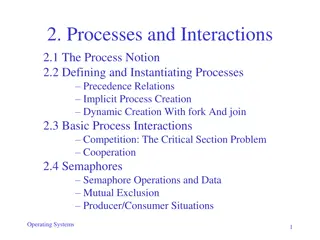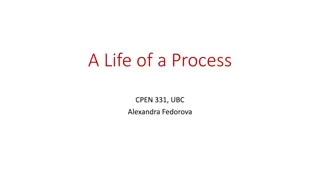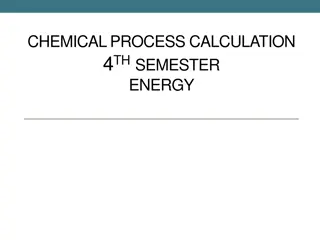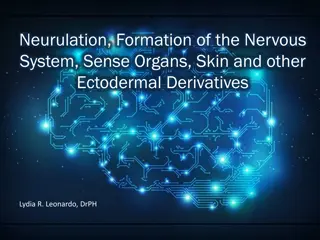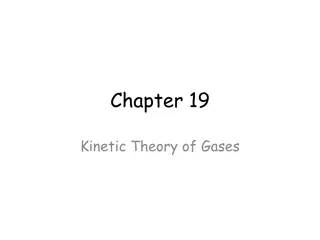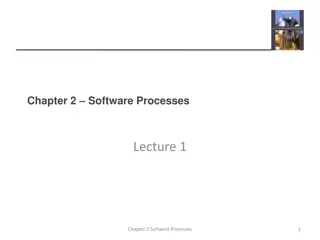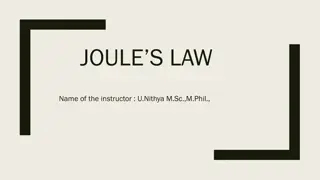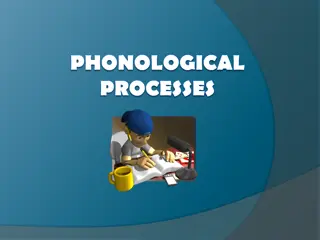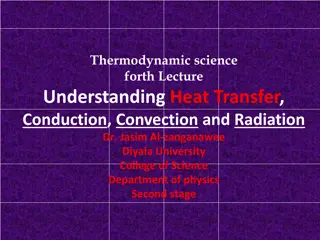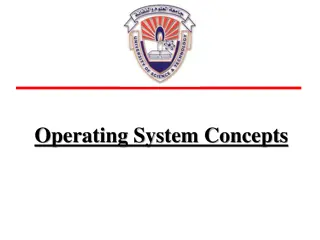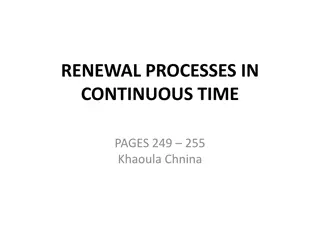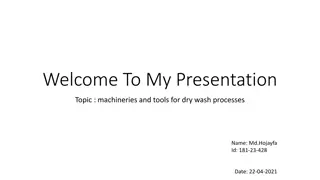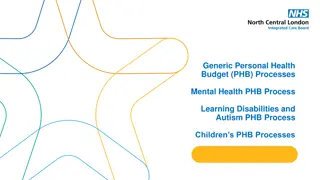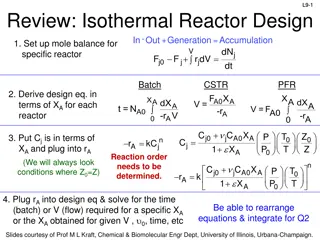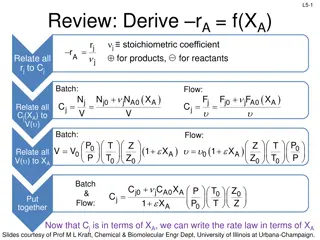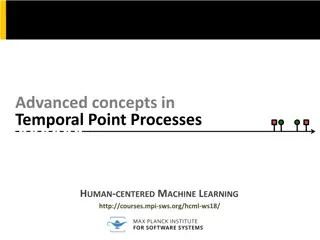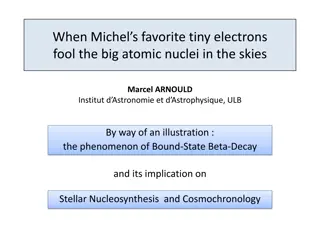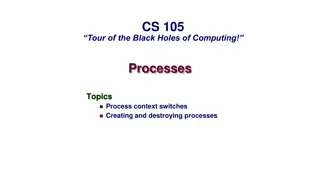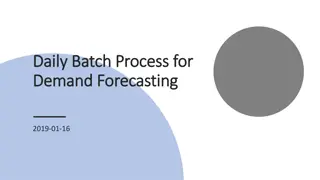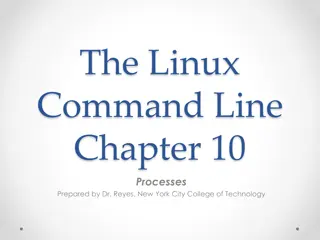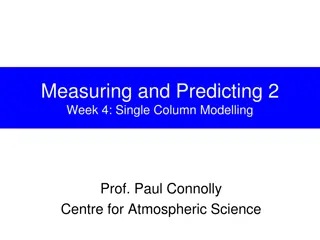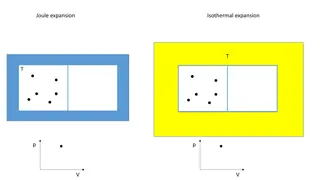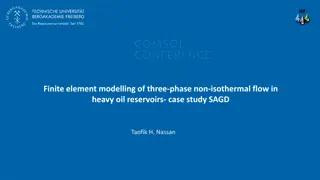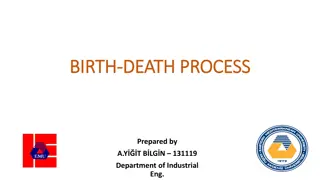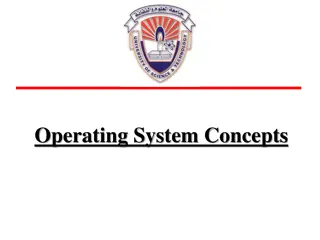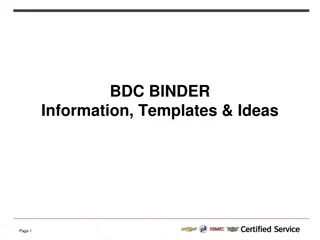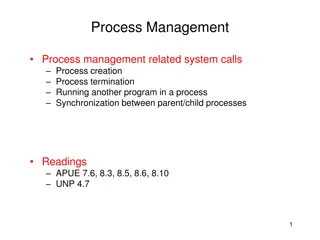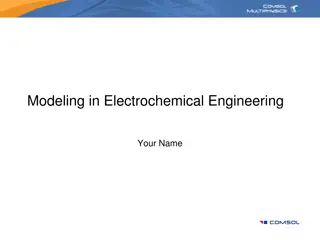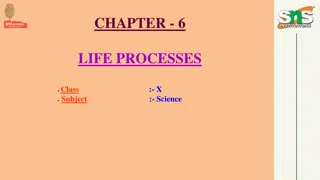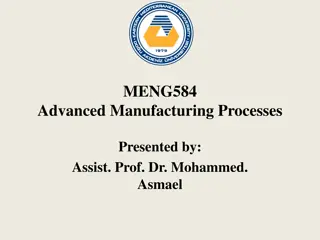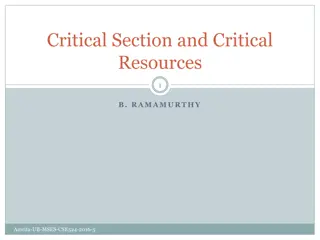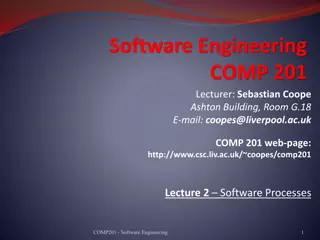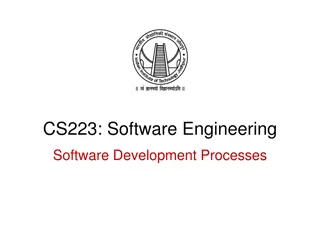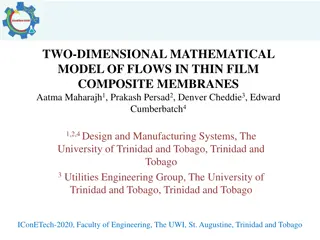Cryogenic Sub-systems
Explore the relationship between liquefaction, refrigeration, and isothermal processes in accelerator systems. Understand the equivalent exergy in Watts for different gases at 1 bar and 300K. Calculate the reversible input power required for latent cooling and the total cooling in different scenario
1 views • 9 slides
Processes and Interactions
Processes in operating systems involve executing programs on CPUs, with each process having its own CPU. Processes run concurrently and can cooperate or compete for resources. Defining, creating, and managing processes is crucial for system efficiency and performance. Precedence relations, semaphore
1 views • 38 slides
A Life of a Process
This content delves into the creation and management of processes in operating systems, covering concepts such as forking processes, process states, address space management, copying processes, and key functions involved in process handling. It provides insights on constructing processes from scratc
0 views • 35 slides
Understanding Energy Balance in Chemical Process Calculations
Energy balance in chemical process calculations involves determining the energy requirements of a system by accounting for energy flow into and out of each unit. This includes defining terms like system and surroundings, distinguishing between open and closed systems, and understanding different pro
1 views • 19 slides
Embryonic Development: Key Processes and Organization
Embryonic development involves neurulation, organogenesis, and morphogenetic processes that shape the nervous system, sense organs, skin, and other ectodermal derivatives. The embryo undergoes allocation and differentiation processes, influenced by epigenetic events and the action of organizers. Emb
2 views • 25 slides
Understanding Kinetic Theory of Gases: Key Concepts and Equations
Exploring the kinetic theory of gases, this content covers essential concepts such as ideal gas behavior, molar mass, the equation of state, and isobaric/isothermal processes. Discover the relationship between pressure, volume, and temperature in gases, along with practical examples and calculations
0 views • 49 slides
Understanding Coastal Processes and Erosion
Coasts are dynamic environments shaped by a variety of processes such as erosion and transportation. Waves influence the size and energy of waves, while erosion is caused by processes like corrasion and solution. Coastal transportation involves suspension, solution, and saltation. The impact of mari
6 views • 18 slides
Understanding Software Processes and Models
Software processes are structured activities essential for software system development, involving specification, design, validation, and evolution. Various process models and approaches like the Rational Unified Process and agile methods are discussed, highlighting the importance of adaptability in
2 views • 105 slides
Understanding Joule's Law and Gas Expansion Processes
Joule's Law states that the energy of a gas is solely dependent on temperature, not volume. This law is discussed along with differences between reversible and irreversible work, as well as isothermal and adiabatic processes. The measurements and interpretations concerning the law are explored, high
1 views • 17 slides
Understanding Phonological Processes in English Language
Phonological processes involve changes in linguistic sounds over time, impacting language fluency and oral production significantly. EFL students can benefit from knowledge of these processes, like linking, gemination, elision, metathesis, assimilation, haplology, and coalescence, to enhance their l
0 views • 17 slides
Advanced Treatment Processes for Faecal Sludge Management
Treatment processes for faecal sludge management involve various stages including preliminary treatment, primary treatment, secondary treatment, and tertiary treatment. Each stage employs mechanical, biological, and chemical processes to separate, decompose, and remove contaminants from the sludge,
0 views • 7 slides
Understanding Heat Transfer in Thermodynamics Lecture
This thermodynamics lecture covers essential topics such as heat transfer, conduction, convection, and radiation. Dr. Jasim Al-zanganawee from Diyala University explains Thermodynamic Processes, Internal Energy, Properties of a System, and Thermodynamic Cycles. Students will learn about extensive an
0 views • 11 slides
Understanding CPU Scheduling in Operating Systems
In a single-processor system, processes take turns running on the CPU. The goal of multiprogramming is to keep the CPU busy at all times. CPU scheduling relies on the alternating CPU and I/O burst cycles of processes. The CPU scheduler selects processes from the ready queue to execute when the CPU i
1 views • 26 slides
Understanding Renewal Processes in Continuous Time
Renewal theory is a branch of probability theory that extends Poisson processes for various inter-arrival times. A renewal process models randomly occurring events over time, such as customer arrivals at a service station or natural phenomena like earthquakes. This article delves into the concept of
0 views • 20 slides
Machineries and Tools for Dry Wash Processes in Garment Industry
Garment washing plays a vital role in enhancing the appearance and quality of textiles. This presentation by Md. Hojayfa delves into the machineries and tools utilized in the dry wash processes of the garment industry. It covers the machines used in washing plants, the objectives of washing, dry pro
1 views • 7 slides
Generic Personal Health Budget (PHB) Processes Overview
This slide deck provides a guide on how to set up, manage, and monitor Personal Health Budgets (PHBs) in various service areas. It covers processes for setting up PHBs, commissioning external care, changing delivery methods, and monitoring money management. The focus is on mental health, learning di
0 views • 17 slides
Chemical Reactor Design Review: Mole Balances, Rate Data Analysis, Method of Excess
This content provides a comprehensive review of isothermal reactor design, including setting up mole balances, deriving design equations in terms of conversion, analyzing rate data to determine reaction order and rate constant, and applying the method of excess to evaluate reaction kinetics. Detaile
0 views • 21 slides
Chemical Reactor Design Principles
Explore the fundamentals of chemical reactor design, including stoichiometry, reaction rates, and reactor scale-up. Learn to derive rate laws and design equations in terms of conversion for batch, CSTR, and PFR reactors. Discover the logic behind isothermal reactor design and calculation of required
0 views • 21 slides
Understanding Advanced Concepts in Temporal Point Processes for Human-Centered Machine Learning
Explore advanced concepts in temporal point processes through the lens of human-centered machine learning. Topics include marked temporal point processes, independent identically distributed marks, dependent marks, and mutually exciting marks. Learn about stochastic dynamical systems such as the Sus
0 views • 8 slides
Understanding Nuclear Decays and Reactions in Stellar Astrophysics
Nuclear decays and reactions, driven by weak interactions, are vital in stellar astrophysics. Various processes like bound-state beta-decay impact nucleosynthesis and cosmochronology. Specific processes in stars involve capture reactions, electron capture, and neutrino-nucleus interactions. Stellar
0 views • 22 slides
Understanding Processes and Multiprocessing in Computing
Processes in computing provide the illusion of exclusive CPU and memory use for each program through logical control flow and address space management. Multiprocessing allows a computer to run multiple processes simultaneously, catering to various user applications. This concept challenges the tradi
0 views • 39 slides
Daily Batch Process for Demand Forecasting - Roadmap and Import Actions
In this data workflow, a roadmap is prepared for batch processes related to demand forecasting. It includes steps for uploading and importing data into Anaplan, SQL sources, EBS processes, and various file imports. The script names and processes are outlined with caution against renaming data hub pr
0 views • 14 slides
Understanding Programs and Processes in Operating Systems
Exploring the fundamental concepts of programs and processes in operating systems, this content delves into the definitions of programs and processes, the relationship between them, the components of a program, what is added by a process, and how processes are created. The role of DLLs, mapped files
0 views • 22 slides
Understanding Linux Processes and Controlling Them
This content provides insights into Linux processes, including parent-child relationships, process management commands like ps and top, background jobs, bringing processes to the foreground, and terminating processes. It also covers killing processes using kill and killall commands.
0 views • 7 slides
Understanding Cloud and Precipitation Processes in Atmospheric Science
This week's module focuses on measuring, predicting, and modeling single-column processes related to clouds and precipitation. Topics covered include ODE and PDE models, advection equations, orographic clouds, warm and cold cloud processes, condensation, warm-rain processes, and more. The importance
0 views • 17 slides
Visual Guide to Joule Expansion in Isothermal Process
Explore the Joule expansion process in an isothermal setting through a series of informative images. Witness the changes in temperature, pressure, and volume as the system undergoes expansion. Gain a deeper understanding of this fundamental thermodynamic concept through visually engaging representat
0 views • 9 slides
Finite Element Modelling of Three-Phase Non-Isothermal Flow in Heavy Oil Reservoirs - SAGD Case Study
Introduction to thermal enhanced oil recovery (TEOR) techniques with a focus on steam injection for heavy oil reservoirs. The study explores the impact of temperature on viscosity using API classification of crude oil. Mathematical models and equations for continuity and momentum in SAGD configurati
0 views • 15 slides
Phonetic Processes Exercises for Linguistics Students
Practice identifying phonetic processes such as stridency deletion, stopping, fronting, and more with exercises involving target words. Determine which processes apply to various words and mark the likely processes for specific targets. Enhance your understanding of substitution processes in linguis
0 views • 5 slides
Pure Birth Processes in Industrial Engineering
Birth-death processes, Yule-Furry models, and pure birth processes are discussed in the context of industrial engineering. The study of evolutionary processes, population dynamics, and radioactive transmutations are explored through mathematical models and examples. The concept of state transitions
0 views • 19 slides
Interprocess Communication in Operating Systems
In operating systems, processes may execute independently or cooperatively, affecting or being affected by other processes. Interprocess communication allows processes to share data and information for reasons like information sharing, computation speedup, modularity, and convenience. There are two
0 views • 22 slides
Importance of a BDC Binder in Documenting Processes
Documenting processes in your BDC using a BDC Binder is crucial to ensure knowledge transfer, especially during turnover. A BDC Binder can be a physical or digital folder used for training and daily operations, containing information like tool logins, call scripts, appointment processes, and dealers
0 views • 8 slides
Understanding Process Management in Computer Systems
Exploring the concepts of process management in computer systems, including process creation, termination, running programs, synchronization between processes, and the components involved in managing processes such as memory, CPU, files, and devices. The importance of processes in sharing system res
0 views • 22 slides
Understanding Electrochemical Systems and Processes
Electrochemical engineering involves the study of devices and processes that convert chemical energy to electrical energy through ionic conductors. This field explores redox reactions, energy-producing processes, electrocatalysis, anodic and cathodic reactions, and the interplay between thermochemic
0 views • 25 slides
Life Processes: Criteria for Living Things and Basic Processes in Organisms
Living things are characterized by movement and specific life processes like nutrition, respiration, transportation, and excretion. Nutrition involves obtaining and utilizing food for energy and growth. There are two main modes of nutrition: autotrophic and heterotrophic. Heterotrophic nutrition inc
0 views • 33 slides
Advanced Manufacturing Processes Overview
The course MENG584 focuses on advanced manufacturing processes including traditional and nontraditional machining techniques. Material removal processes, machining accuracy, and surface finish considerations are highlighted. Various machining methods such as cutting, abrasion, thermal, chemical, and
0 views • 24 slides
Managing Critical Resources in Concurrent Processes
Concurrent processes can enhance performance but require careful handling of critical resources to prevent inconsistency. Utilizing semaphores for mutual exclusion and synchronization can help control access to shared resources. This article discusses the principles of concurrency, issues with inter
0 views • 18 slides
Comprehensive Overview of Peace Processes and the Role of Women and Girls
Peace processes involve a variety of formal and informal activities, with the participation of different actors such as international organizations, grassroots movements, and individuals. Formal peace processes include conflict prevention, peace-building, and disarmament, while informal activities e
0 views • 12 slides
Understanding Software Engineering Processes
Dive into the world of software engineering processes through a comprehensive exploration of building development processes, tasks involved, and the characteristics of a process. Discover how these processes ensure systematic software development and the key steps required for successful project com
0 views • 33 slides
Understanding Software Engineering and Development Processes
Explore the key concepts of software engineering, including misconceptions, legacy software, and development phases. Learn about professional responsibilities, the need for software processes, the ETVX model, and different properties of software processes. Discover the components of software process
0 views • 57 slides
Two-Dimensional Mathematical Model of Flows in Thin Film Composite Membranes
This study presents a mathematical model for flows in thin film composite membranes, focusing on the permeation of solvent flux and solute rejection. Assumptions include incompressible fluid, constant diffusion of chemical species, and isothermal conditions. Equations describe water flux, solute flu
0 views • 19 slides

